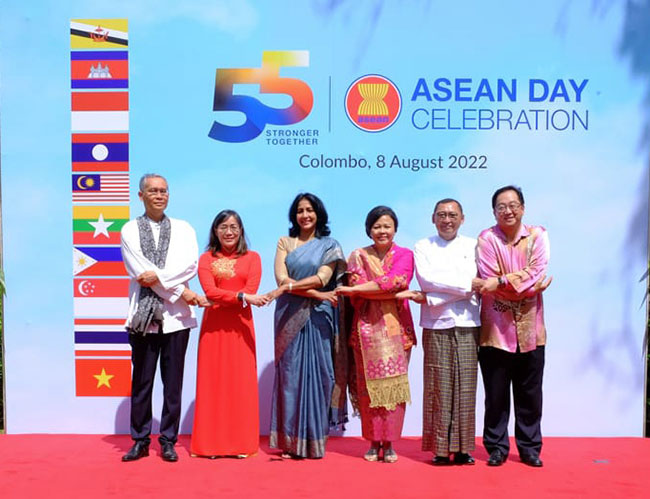News
55th ASEAN Day marked in Colombo

Secretary to the Ministry of Foreign Affairs Aruni Wijewardane was the Chief Guest at the 55th ASEAN Day on 8 August, 2022 at the Indonesian Embassy in Colombo. The event was hosted by Ambassador of Indonesia Dewi Gustina Tobing and the Heads of Mission of the four other ASEAN Member States in Colombo, High Commissioner of Malaysia Tan Yang Thai, Ambassador of Myanmar Han Thu, Ambassador of Thailand Poj Harnpol, and Ambassador of Vietnam Ho Thi Thanh Truc.
Foreign Secretary Wijewardane in her remarks, recalled the strong ties between Sri Lanka and Southeast Asian countries which date back to ancient times when Sri Lanka was known worldwide as a major maritime economic hub. In continuing these connections which are centuries old, today there are many opportunities for Sri Lanka to partner with successful ASEAN economies.
The Foreign Secretary highlighted the recent visit of Foreign Minister Ali Sabry to Cambodia to attend the ASEAN Regional Forum where he engaged constructively with ASEAN Members, Observers and Dialogue Partners. She also referred to the ASEAN ACT – ‘Addressing Challenges Together’ as an apt theme as ASEAN works towards a sustainable future of revitalizing economic activity, ensuring food, energy and climate security and addressing the regional security environment.
Chief of Protocol Senarath Dissanayake and Director General South East Asia Division, Satya Rodrigo of the Ministry of Foreign Affairs also attended the event which was followed by a reception.
News
Fund issues may leave counting centres without back-up power tomorrow: GNs’ trade union

“Power failures on election day could occur due to natural causes or sabotage”
Funds allocated for hiring power generators for the counting centres were inadequate, and the Grama Niladaris (GNs) would not be able to ensure a back-up power supply to those places, President of the Sri Lanka United Grama Niladhari Association, Nandana Ranasinghe warned yesterday.
Addressing a press conference, Ranasinghe said: “Under these circumstances, it will not be possible to provide the counting centres with generators. Funds must also be allocated for hiring electric bulbs, cables and transporting generators as well.
“Unless funds are made available immediately, the GNs must not be held responsible if something goes wrong in the event of a power failure, either due to natural causes or sabotage. The GNs must not be asked to bear the cost of supplying back-up power to counting centres.
“In some areas, the District Returning Officers are pressuring the GNs to bear the cost of hiring power generators. The GNs must not be forced to spend their personal funds to provide facilities to counting centres.
“If a power outage occurs, it will definitely cause issues at counting centres. In the event of disruptions to the vote counting process, the results in the polling divisions under the centres may have to be annulled.”
News
LG polls: More than 65,000 cops and 8,500 military personnel deployed

More than 65,000 police officers would be deployed for the 06 May local government (LG) elections from today (05), Police Media Spokesman SSP Buddhika Manatunga told The Island, yesterday. The police personnel will include members of the Police Special Task Force, intelligence units, security divisions, and mobile patrol teams.
Army Media Spokesman Brigadier Varuna Gamage told The Island that 8,500 military personnel would be deployed on the roads across the country in view of the LG elections.
He said the Army would coordinate with the police, and that troops in all military camps had been placed on standby to face any situation.
By Norman Palihawadane and Chaminda Silva
News
FSP: Govt. creating conditions for procurement malpractices

The Frontline Socialist Party (FSP) has alleged that the NPP government, too, like its predecessor, was creating a situation where medicines can be purchased at higher prices outside tender procedures.
The Education Secretary of the FSP Pubudu Jayagoda yesterday (04) alleged that the NPP Cabinet was planning to endorse the Health Ministry move. Addressing the media at the party office in Nugegoda, Jayagoda alleged that the NPP had adopted a strategy similar to that of Keheliya Rambukwella to procure medicines.
The FSP said: “The status quo ante has been restored in respect of health sector procurements. Time was when tenders were deliberately delayed. Orders weren’t placed on time, creating artificial shortages. Then, emergency purchases were made at higher prices; often substandard drugs were purchased. This government came to power promising reforms, but now the question is whether it is doing what it blamed its predecessor for.
“We have received information about a cabinet paper that Health Minister Nalin Jayathissa is going to present to the Cabinet tomorrow. According to an audit report dated March 29, 2025, Sri Lanka faces a shortage of 313 essential medicines over the next three months and 202 of these drugs can be procured through regular means.
“For the remaining 101 medicines, the Health Minister proposes in Sections 2.3 and 2.4 of the Cabinet paper standard procurement procedures should be bypassed and procurement should be done as government-to-government (G2G) deals in violation of the fundamental procurement regulations of transparent competitive bidding processes and the selection of the lowest bidder. Further, the Minister proposes to appoint a seven-member committee to formulate the new procurement methodology and to delegate the selection of supplier countries for medicine procurement to the Ministry of Foreign Affairs.
“According to Section 8.1 of the Procurement Guidelines, direct procurement without calling for tenders is permitted only under four specific circumstances. That is when the medicine is produced by only one manufacturer, during emergency situations such as pandemics; when there is a severe shortage of the medicine and when the medicine is produced by the State Pharmaceutical Manufacturing Corporation. The justification being used now is the ‘medicine shortage’ clause.
“But how did this shortage occur in the first place? Under the Ranil Wickremesinghe government in August 2024, then-Health Minister Ramesh Pathirana attempted to replace existing medicine suppliers with a group of cronies. When that move drew heavy criticism, the Ministry got cold feet.
“Under pressure from the Indian High Commission, the government tried to procure medicines directly from India without calling for tenders. The current NPP government is now following in the footsteps of the previous Ranil-Ramesh administration. While working on procurement methodologies for 2026, they did not take action to place orders for essential medicines for 2025 even by November-December 2024.”
-

 News6 days ago
News6 days agoJapan-funded anti-corruption project launched again
-

 News6 days ago
News6 days agoSethmi Premadasa youngest Sri Lankan to perform at world-renowned Musikverein in Vienna
-

 Sports5 days ago
Sports5 days agoOTRFU Beach Tag Rugby Carnival on 24th May at Port City Colombo
-

 News3 days ago
News3 days agoRanil’s Chief Security Officer transferred to KKS
-

 Business6 days ago
Business6 days agoNational Savings Bank appoints Ajith Akmeemana,Chief Financial Officer
-

 Opinion1 day ago
Opinion1 day agoRemembering Dr. Samuel Mathew: A Heart that Healed Countless Lives
-

 Features4 days ago
Features4 days agoThe Broken Promise of the Lankan Cinema: Asoka & Swarna’s Thrilling-Melodrama – Part IV
-

 Features5 days ago
Features5 days agoTrump tariffs and their effect on world trade and economy with particular





















